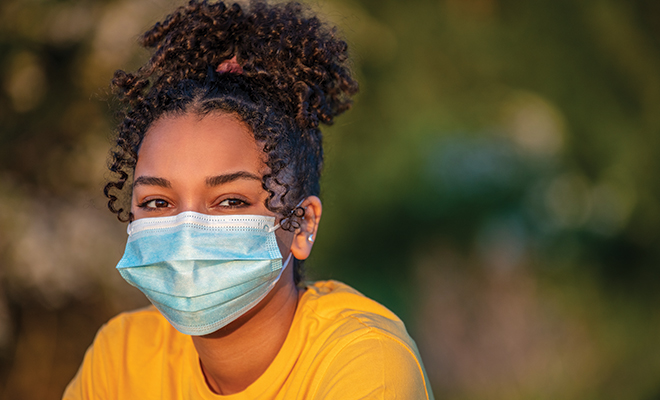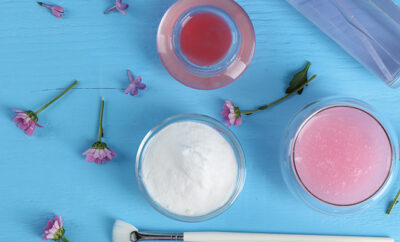
When Life Gives You Maskne: What? Why? And How to Get Rid of Zit
You may have heard the term maskne and, like me, you have been able to puzzle out that someone had created a portmanteau from mask and acne. The important question then becomes: Why? Fortunately for all of us, we can just ask the internet.
Maskne is a cluster of conditions with a common cause. It’s also the bane of anyone whose circumstances keep them in a mask all day. The people writing about maskne are your standard beauty bloggers, but also dermatologists.
Like skin, not all maskne is the same. For example, not all maskne is even acne. Much of the time maskne is a rash. Sometimes the irritation is contact dermatitis, or in layperson’s terms, a rash caused by an allergic reaction. Perioral dermatitis is another common culprit. It is a facial rash that is sometimes considered a type of rosacea. Unfortunately, perioral dermatitis usually forms around the mouth, nose and eyes. Dermatologists are still debating the underlying cause.
The most common cause of maskne, though, is acne mechanica. Until the widespread wearing of masks, this kind of acne was most often seen in athletes. It is caused by heat, pressure, oil build-up and friction over time.
So, what’s a busy, mask-wearing woman to do? The aphorism “An ounce of prevention is worth a pound of cure” is quite apt in this situation. First things first: simplify your skincare. In the morning wash your face with a gentle non-soap cleanser, then apply a light, unscented moisturizer. Ideally, the moisturizer should have sunscreen in it. If it doesn’t, you should find a light, unscented sunscreen to layer over the moisturizer. Repeat this routine when you get home and take off your mask in the evening. Using any kind of product with retinol in it under your mask is strictly verboten. Under the mask, the effect of the retinol is amplified, which will cause serious skin irritation.
You may have noticed I didn’t say anything about applying makeup. This is hard for some people to accept. Maybe you’re one of them and that’s okay. It’s okay to feel a bit weird about going out bare-faced but foundation, concealer, primer, blush, setting spray or powder aren’t your friends right now. Right now is a great time to give your skin a break and let it heal from years (or decades) of daily product use. You don’t need a full face of makeup to rule your world. You’ve got this. Use this time to get good at your eye makeup. There are a lot of stunning eye looks out there right now!
Choosing a high-quality mask also plays a vital role in keeping your skin happy. If you aren’t a healthcare worker, opt for an organic fabric such as cotton, bamboo, hemp, silk, linen or modal. These fabrics will allow your pores to breathe and absorb some oil from your face. You should avoid masks made of synthetic or synthetic blends such as polyester and rayon. If there is any metal on the mask, find out what kind. Nickel is the most commonly used cheap metal. Even if you aren’t usually allergic to nickel, having it on your face all day every day for months could cause you to develop an allergy.
If you do wear a mask every day, get several and wash them after each use. Ideally, use a gentle, dye-free, fragrance-free detergent and follow the manufacturer or maker’s care instructions.
Despite our best efforts, due to compounding factors such as stress and hormones, maskne may still strike. Treating maskne is a much more delicate and strategic endeavor than treating a typical breakout, and you may want to go ahead and touch base with your dermatologist for more specific advice, particularly if you think you have acne mechanica.
An at-home treatment for acne mechanica, in addition to the skin care advice, apply a benzoyl peroxide treatment to affected areas, but only use a 2.5 percent or 5 percent strength. If you think you have contact dermatitis, dab the rash with hydrocortisone cream. When applying hydrocortisone cream, use kindergarten-glue-rules, “Just a dot. Not a lot.” Using too much can supercharge your dermatitis and make it worse.
Hyperpigmentation can accompany maskne in people with black or brown skin and there are specific ways to treat it. Your first and most important weapon against hyperpigmentation is sunscreen. Wear your sunscreen even if you’re going to be in the office all day. Blue light from computer screens can worsen hyperpigmentation and sunscreen can help protect you from this bizarre source of irritation. In the short term, you can use glycolic acid, but experts warn against using it long term without consulting a dermatologist.
If these strategies don’t work for you, your dermatologist is the best go-to professional for treating maskne or any other skin issues. ■
Sources: aad.org, nytimes.com, unmc.edu and independent.co.uk, webmd.com.







